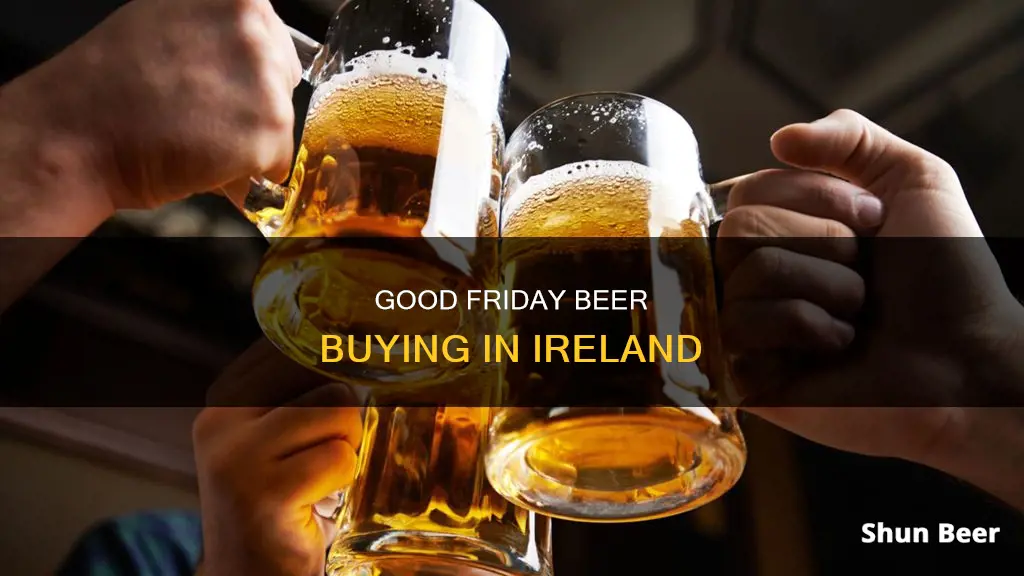
For almost 100 years, it was prohibited to buy beer on Good Friday in Ireland. The 1927 Intoxicating Liquor Act banned the sale of alcohol on Good Friday, Christmas Day, and St Patrick's Day. However, in 2018, the Dáil passed new legislation that abolished the ban on drinking on Good Friday. This change in law was primarily driven by the desire to boost tourism in Ireland and move towards a separation of church and state. So, can you buy beer on Good Friday in Ireland now?
| Characteristics | Values |
|---|---|
| Can you buy beer on Good Friday in Ireland? | Yes |
| Year the sale of alcohol on Good Friday was banned | 1927 |
| Year the ban was lifted | 2018 |
| Duration of the ban | 90-91 years |
| Reason for the ban | Respect for Good Friday as a religious holiday |
| Reason for lifting the ban | To boost tourism and separate Church and State |
What You'll Learn
- The ban on buying beer on Good Friday in Ireland was lifted in 2018
- The Intoxicating Liquor Act of 1927 prohibited the sale of alcohol on Good Friday
- The law was changed to boost tourism and separate church and state
- The sale of alcohol is still restricted in Northern Ireland on the Thursday before Easter until Easter Sunday
- The Restaurants Association of Ireland claims the ban costs them €25 million in lost revenue

The ban on buying beer on Good Friday in Ireland was lifted in 2018
For almost a century, drinking alcohol on Good Friday was prohibited in Ireland. The Intoxicating Liquor Act of 1927 banned the sale of alcohol on Good Friday, Christmas Day, and St. Patrick's Day. However, in 2018, this long-standing ban was lifted, allowing pubs and shops to sell alcoholic beverages on Good Friday for the first time in over 90 years.
The change in legislation was primarily driven by the desire to boost tourism during the busy Easter period. TD David Stanton, a government minister, emphasized the significant contribution of tourism to the Irish economy and how this change would cater to the evolving demographics of visitors. Additionally, the move was seen as a step towards separating church and state in Ireland, reducing the influence of traditional religious practices on legislation.
The ban's repeal meant that pubs, hotels, restaurants, and shops could serve and sell alcohol on Good Friday without restrictions. This change addressed the concerns of groups like the Restaurants Association of Ireland and the Licensed Vintners Association, who had argued that the ban negatively impacted their businesses and tourism revenue. They estimated losses of up to €25 million due to the previous restrictions.
While the ban has been lifted, it's important to note that individual pubs and shops may still choose their operating hours and whether or not to sell alcohol on this day. Additionally, there are still some restrictions in place for the sale of alcohol during the Easter holiday period in Ireland, particularly in Northern Ireland, where pubs must comply with restricted opening hours from the Thursday before Easter until Easter Sunday.
So, while the ban on buying beer on Good Friday in Ireland has been lifted since 2018, it's always a good idea to check the local laws, opening hours, and individual establishments' policies before making any concrete plans.
The Best Places to Buy Chinese Beer
You may want to see also

The Intoxicating Liquor Act of 1927 prohibited the sale of alcohol on Good Friday
The sale of alcohol on Good Friday in Ireland was prohibited by The Intoxicating Liquor Act of 1927. This law was in place for nearly 100 years, from 1927 until 2018, when new legislation was passed to abolish it.
The Act prohibited the sale of all alcoholic drinks on Good Friday, Christmas Day, and St Patrick's Day. The law was intended to allow for reflection, rest, and prayer on these holy days. While the ban on selling alcohol on St Patrick's Day was repealed in 1960, the laws regarding Good Friday and Christmas Day remained in place until 2018.
During the nearly 100 years that the law was in effect, pubs and shops were forbidden from selling alcohol on Good Friday. However, there were some exemptions to the rule. Alcohol could be served at airports, ferry ports, and train stations, as long as the drinker had a ticket for a journey of at least 10 miles from the station. Alcohol was also permitted to be sold to theatre-goers and guests in hotels, as long as the beverage was accompanied by a meal. Greyhound racing stadiums were also exempt from the law.
Despite opposition from some members of parliament, the decision to lift the ban on alcohol sales on Good Friday was seen as a progressive move towards separating church and state in Ireland, as well as a boost for the country's tourism industry.
Buying Taybeh Beer in New York City
You may want to see also

The law was changed to boost tourism and separate church and state
The Good Friday alcohol ban in Ireland was introduced in 1927 as part of a broader legislative act that also prohibited the sale of alcohol on Christmas Day and St. Patrick's Day. The law was influenced by the Catholic Church, which sought to institute an atmosphere of solemnity on these religious holidays. However, in 1960, the St. Patrick's Day prohibition was repealed due to waning church influence and growing commercial pressure.
In recent years, there have been efforts to further separate church and state in Ireland. In 2018, the Dáil passed new legislation, the Intoxicating Liquor (Amendment) Bill 2017, which abolished the prohibitive drinking laws on Good Friday. This move was supported by government minister David Stanton, who cited the importance of tourism to the Irish economy, especially during the busy Easter period. He also acknowledged the reduction in traditional religious practices due to changing demographics and increasing diversity in the population.
The amendment was introduced by independent Senator Billy Lawless, who viewed it as "a progressive step" towards "a separation of church and state". The law change allows pubs, hotels, restaurants, and shops to serve alcohol on Good Friday, bringing an end to the 90-year-old ban. This change aligns with other recent efforts to cleave church from state in Ireland, such as the call for a debate on a Christian prayer that is read before each meeting of the Irish legislature's lower house.
While the law change was primarily driven by tourism and the separation of church and state, it is worth noting that not everyone supported the repeal of the Good Friday alcohol ban. Some saw it as a threat to Ireland's cultural identity, while others argued that it went against the government's policy of trying to reduce alcohol-related harm. Despite these opposing views, the amendment was passed and signed off by President Michael D Higgins, allowing for the sale of alcohol on Good Friday in the Republic of Ireland.
Best Places to Buy Barrilitos Beer
You may want to see also

The sale of alcohol is still restricted in Northern Ireland on the Thursday before Easter until Easter Sunday
In the Republic of Ireland, the sale of alcohol on Good Friday was prohibited for nearly 100 years. From 1927 to 2018, the Intoxicating Liquor Act banned the sale of alcohol on Good Friday, Christmas Day, and St. Patrick's Day. However, in 2018, new legislation was passed, abolishing the ban on Good Friday, leaving only the ban on Christmas Day in place. This change in the law was primarily driven by the desire to boost tourism during the busy Easter period and to move towards a separation of church and state.
However, the situation is different in Northern Ireland, where Good Friday is a public holiday. In Northern Ireland, pubs must comply with restricted opening hours from the Thursday before Easter until Easter Sunday. While the sale of alcohol is permitted after 5 pm on Good Friday, pubs must adhere to limited operating hours during this period.
The amendment to the Intoxicating Liquor Act, which lifted the ban in the Republic of Ireland, was expected to be signed off by President Michael D. Higgins and implemented for Good Friday in 2018. Despite opposition from some members of parliament, the change in law allows pubs, shops, hotels, and restaurants in the Republic of Ireland to sell alcohol on Good Friday, aligning with their regular operating hours.
Buying Beer at Disneyland: Is It Possible?
You may want to see also

The Restaurants Association of Ireland claims the ban costs them €25 million in lost revenue
The Restaurants Association of Ireland (RAI) has claimed that the ban on selling alcohol on Good Friday costs them €25 million in lost revenue. While restaurants are permitted to open and sell food and non-alcoholic drinks, they are unable to recoup this loss on what is a busy holiday period.
RAI has argued that the ban is detrimental not only to their sector but also to the capital city and the tourism industry. They have pointed out that tourists visiting Ireland for the Easter holiday are often confused and frustrated by the prohibition on alcohol sales, which can negatively impact their experience and perception of the country. This is particularly relevant as tourism makes a significant contribution to Ireland's economy, especially during holiday periods.
The association has emphasised that the ban is not compulsory for restaurants, and they are free to open and serve customers. However, they face restrictions on selling and serving alcohol, which can deter customers and result in a significant financial loss. This claim of lost revenue is supported by the fact that, since the ban was lifted in 2018, retailers and pubs have been operating at normal hours and have reported no issues with customers purchasing alcohol.
The impact of the ban is also felt beyond the restaurant industry, affecting other sectors such as pubs, shops, and off-licences. The loss of business during this period has been a significant concern for these industries, and the ban has been seen as a hindrance to the country's overall economic growth, especially in the tourism sector.
Iowa's Early Morning Beer Buying Laws Explained
You may want to see also
Frequently asked questions
Yes. Since 2018, the sale of alcohol on Good Friday has been legal in Ireland.
For nearly 100 years, from 1927 until 2018, the sale of alcohol on Good Friday was prohibited in Ireland.
The law was changed to boost tourism in Ireland and to separate Church and State.







